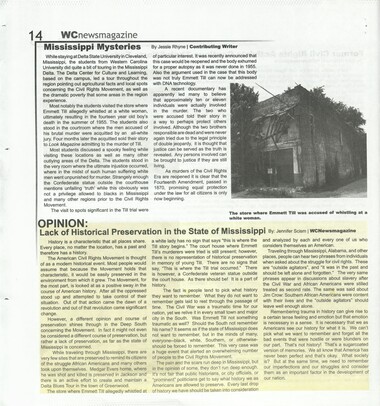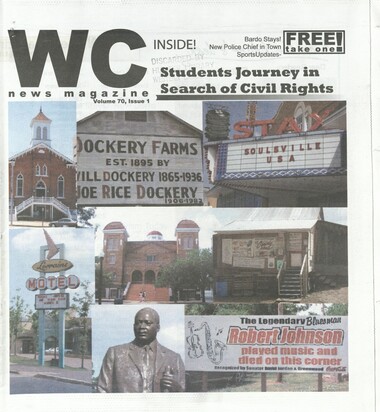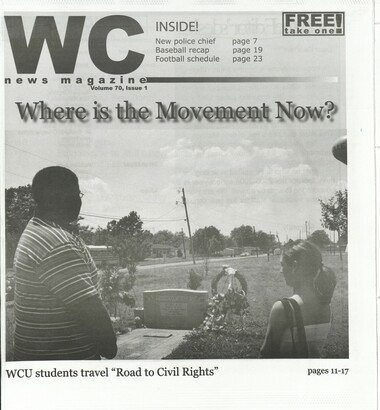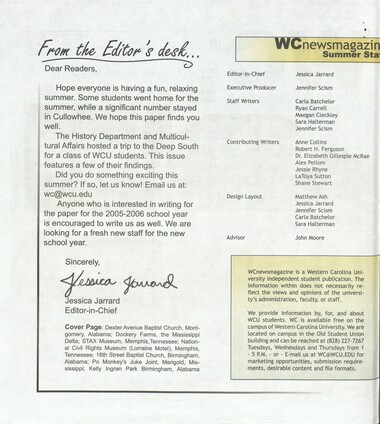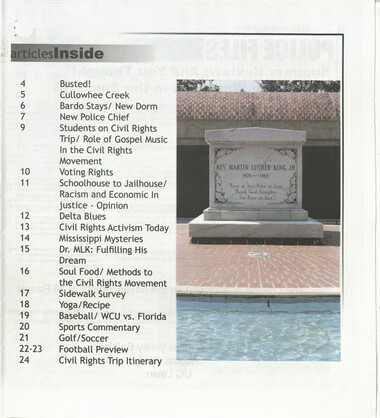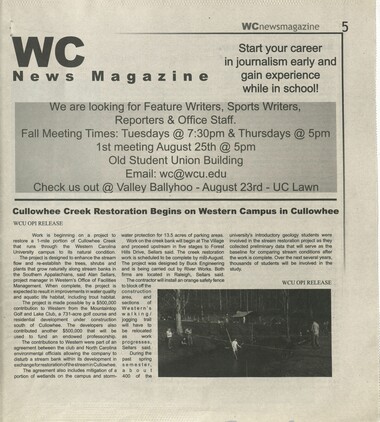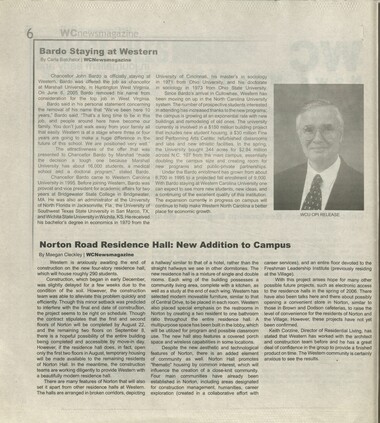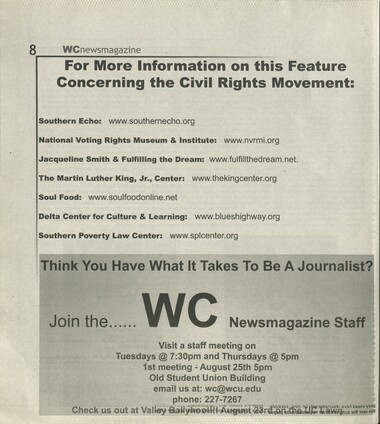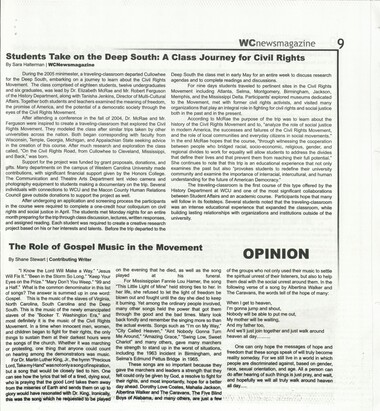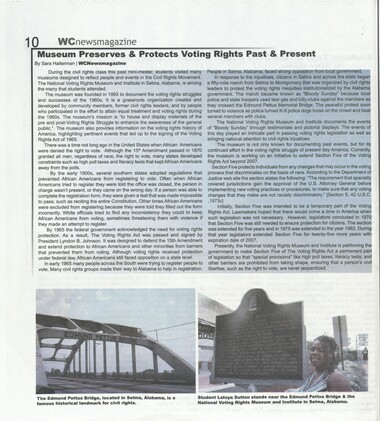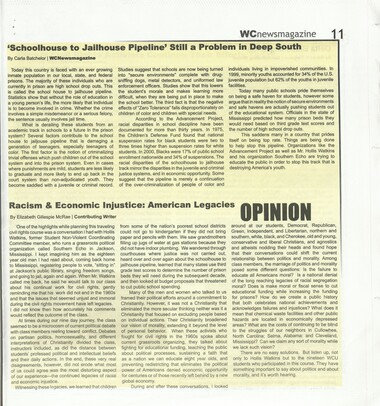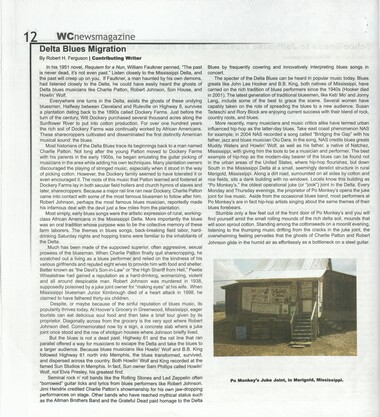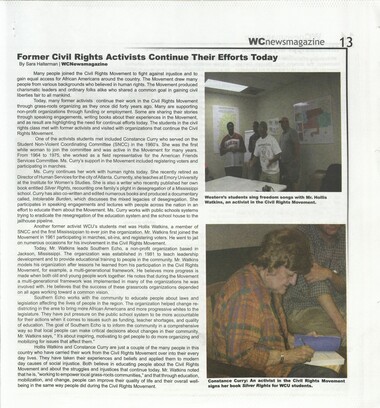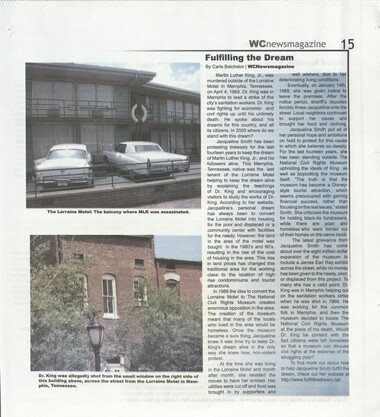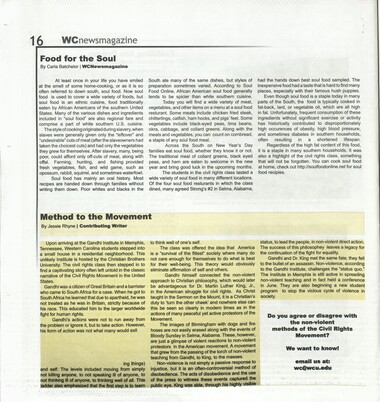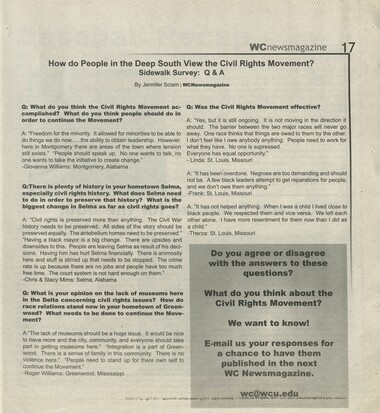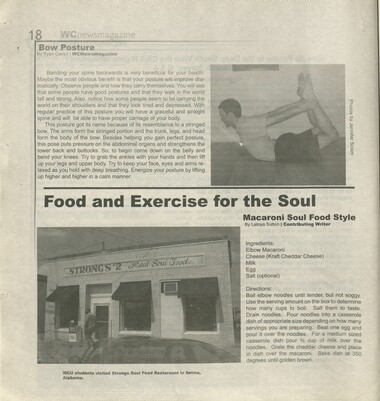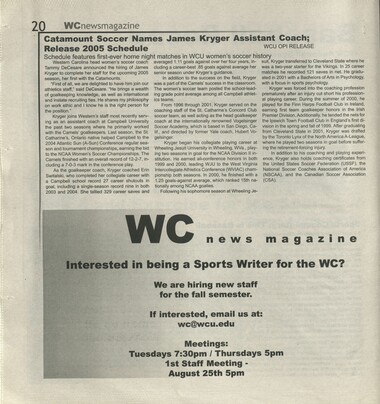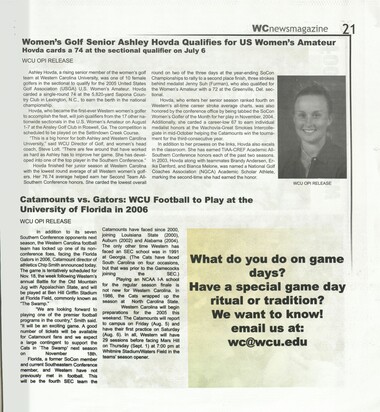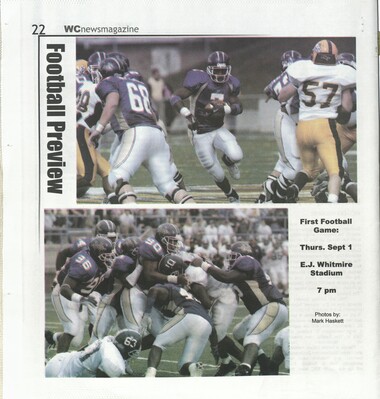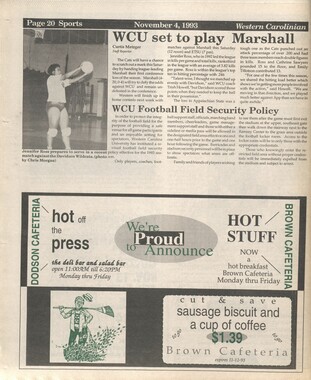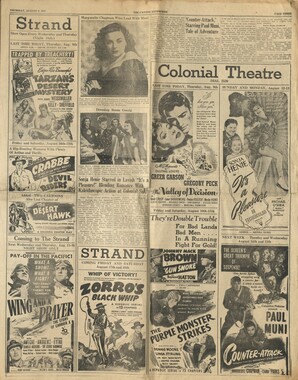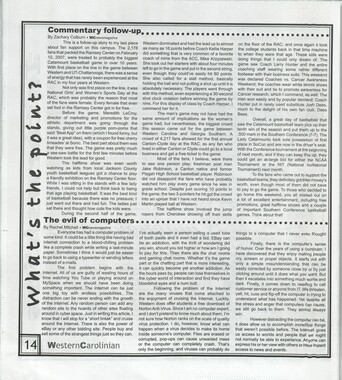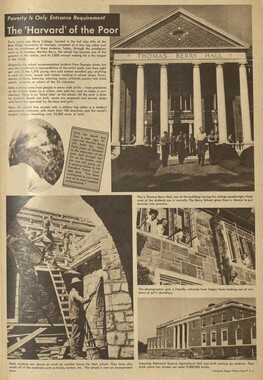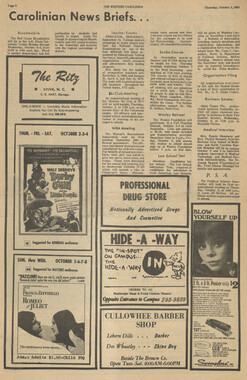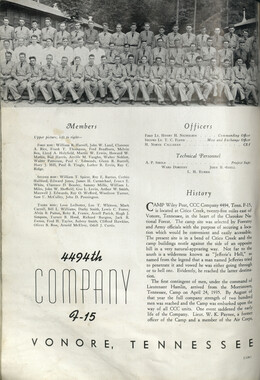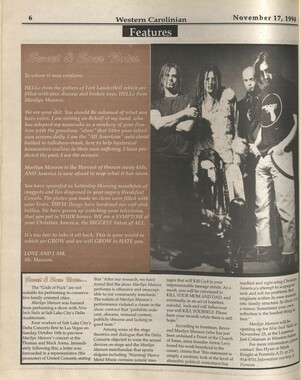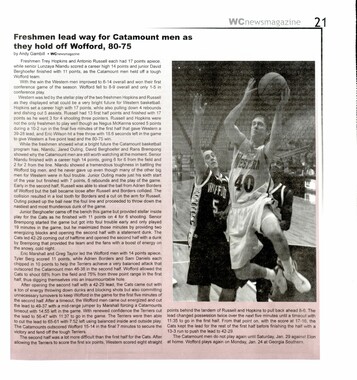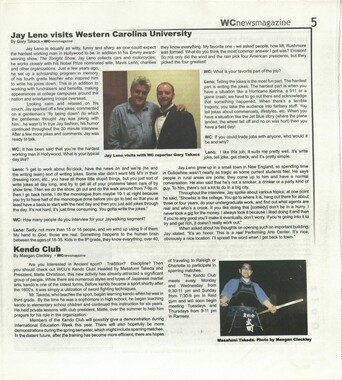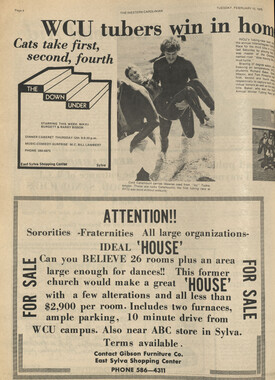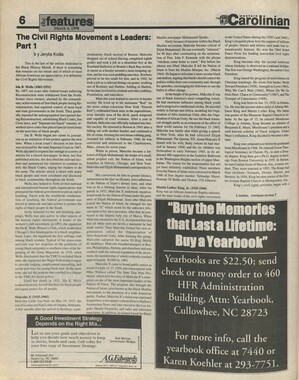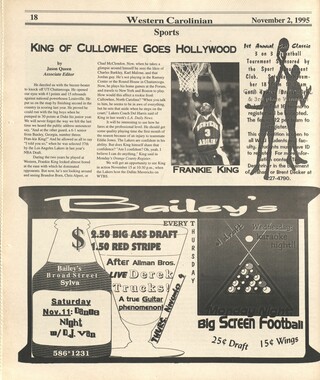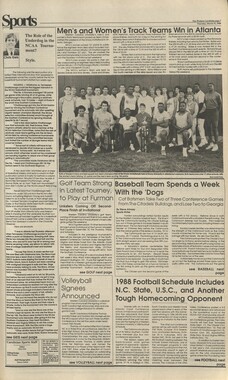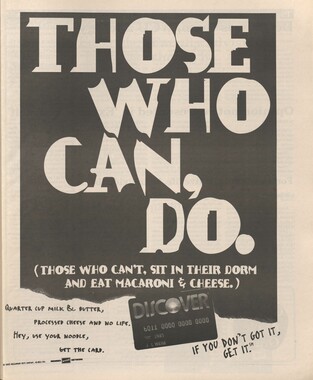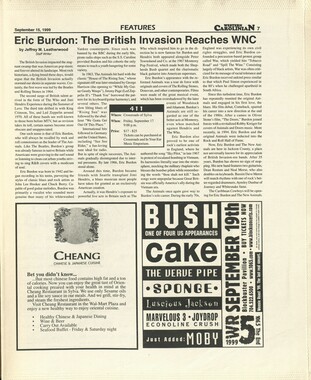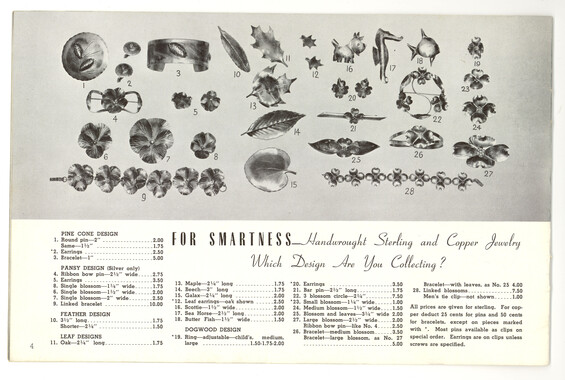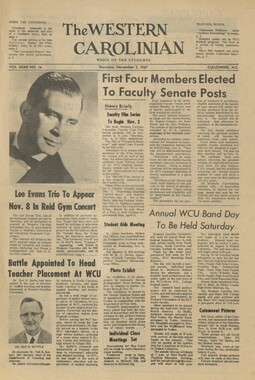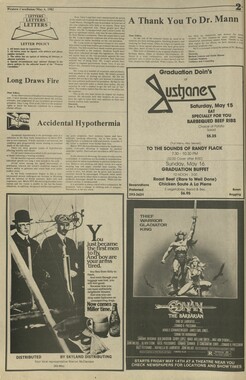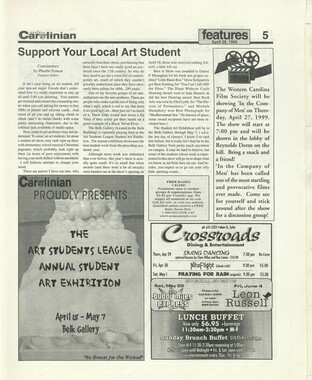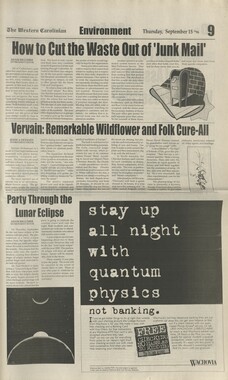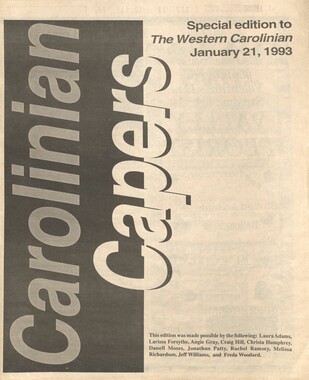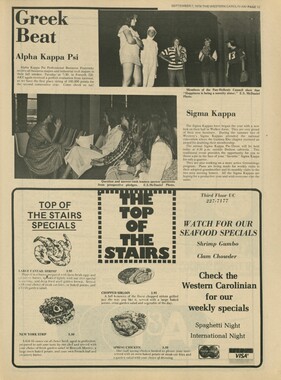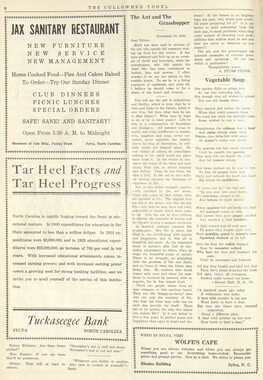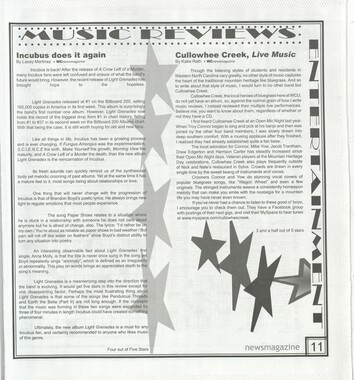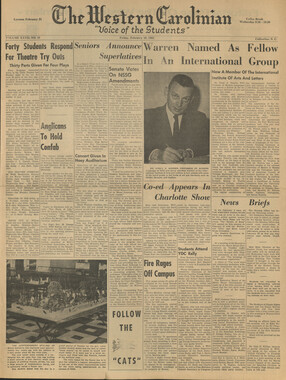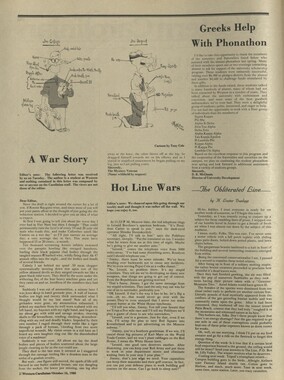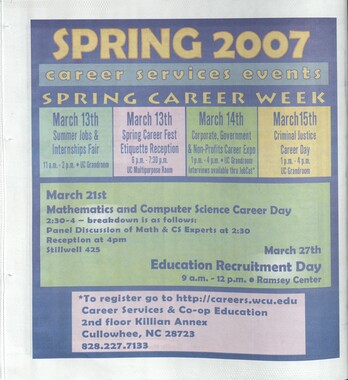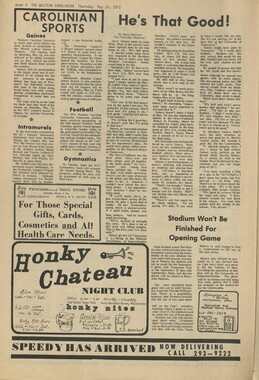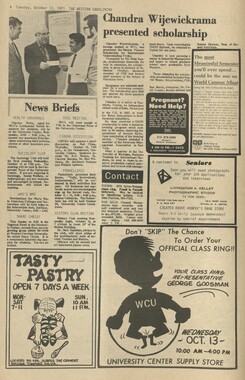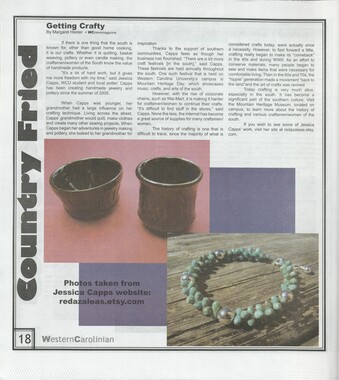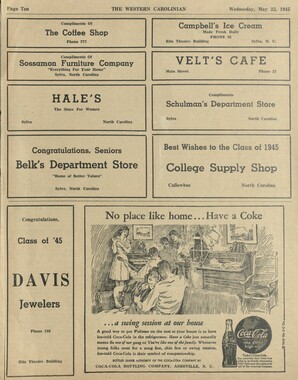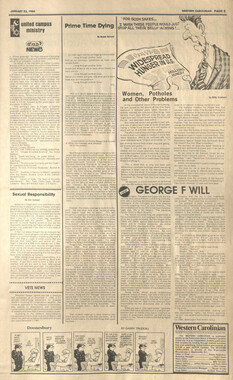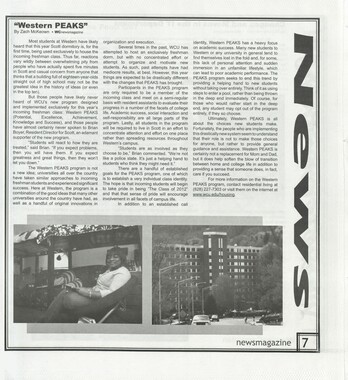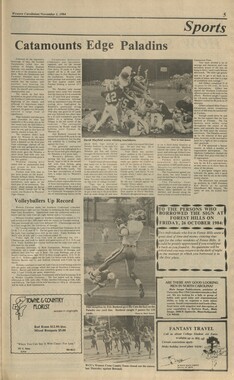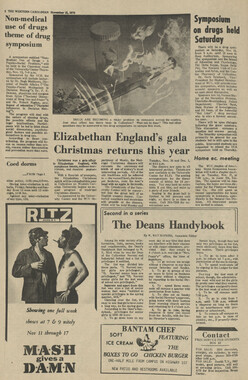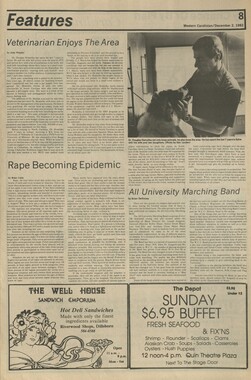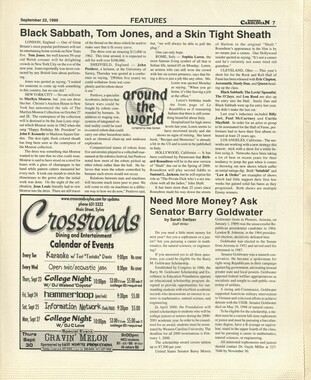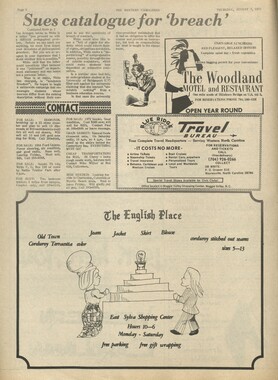Western Carolina University (21)
View all
- Canton Champion Fibre Company (2308)
- Cherokee Traditions (291)
- Civil War in Southern Appalachia (165)
- Craft Revival (1942)
- George Masa Collection (137)
- Great Smoky Mountains - A Park for America (3080)
- Highlights from Western Carolina University (422)
- Horace Kephart (973)
- Journeys Through Jackson (159)
- LGBTQIA+ Archive of Jackson County (89)
- Oral Histories of Western North Carolina (318)
- Picturing Appalachia (6617)
- Stories of Mountain Folk (413)
- Travel Western North Carolina (153)
- Western Carolina University Fine Art Museum Vitreograph Collection (129)
- Western Carolina University Herbarium (92)
- Western Carolina University: Making Memories (738)
- Western Carolina University Publications (2491)
- Western Carolina University Restricted Electronic Theses and Dissertations (146)
- Western North Carolina Regional Maps (71)
- World War II in Southern Appalachia (131)
University of North Carolina Asheville (6)
View all
- Allanstand Cottage Industries (62)
- Appalachian National Park Association (53)
- Bennett, Kelly, 1890-1974 (1463)
- Berry, Walter (76)
- Brasstown Carvers (40)
- Carver, George Washington, 1864?-1943 (26)
- Cathey, Joseph, 1803-1874 (1)
- Champion Fibre Company (233)
- Champion Paper and Fibre Company (297)
- Cherokee Indian Fair Association (16)
- Cherokee Language Program (22)
- Crowe, Amanda (40)
- Edmonston, Thomas Benton, 1842-1907 (7)
- Ensley, A. L. (Abraham Lincoln), 1865-1948 (275)
- Fromer, Irving Rhodes, 1913-1994 (70)
- George Butz (BFS 1907) (46)
- Goodrich, Frances Louisa (120)
- Grant, George Alexander, 1891-1964 (96)
- Heard, Marian Gladys (60)
- Kephart, Calvin, 1883-1969 (15)
- Kephart, Horace, 1862-1931 (313)
- Kephart, Laura, 1862-1954 (67)
- Laney, Gideon Thomas, 1889-1976 (439)
- Masa, George, 1881-1933 (61)
- McElhinney, William Julian, 1896-1953 (44)
- Niggli, Josephina, 1910-1983 (10)
- North Carolina Park Commission (105)
- Osborne, Kezia Stradley (9)
- Owens, Samuel Robert, 1918-1995 (11)
- Penland Weavers and Potters (36)
- Roberts, Vivienne (15)
- Roth, Albert, 1890-1974 (142)
- Schenck, Carl Alwin, 1868-1955 (1)
- Sherrill's Photography Studio (2565)
- Southern Highland Handicraft Guild (127)
- Southern Highlanders, Inc. (71)
- Stalcup, Jesse Bryson (46)
- Stearns, I. K. (213)
- Thompson, James Edward, 1880-1976 (226)
- United States. Indian Arts and Crafts Board (130)
- USFS (683)
- Vance, Zebulon Baird, 1830-1894 (1)
- Weaver, Zebulon, 1872-1948 (58)
- Western Carolina College (230)
- Western Carolina Teachers College (282)
- Western Carolina University (2008)
- Western Carolina University. Mountain Heritage Center (18)
- Whitman, Walt, 1819-1892 (10)
- Wilburn, Hiram Coleman, 1880-1967 (73)
- Williams, Isadora (3)
- Cain, Doreyl Ammons (0)
- Crittenden, Lorraine (0)
- Rhodes, Judy (0)
- Smith, Edward Clark (0)
- Appalachian Region, Southern (3032)
- Asheville (N.C.) (1945)
- Avery County (N.C.) (26)
- Blount County (Tenn.) (195)
- Buncombe County (N.C.) (1680)
- Cherokee County (N.C.) (283)
- Clay County (N.C.) (556)
- Graham County (N.C.) (238)
- Great Smoky Mountains National Park (N.C. and Tenn.) (525)
- Haywood County (N.C.) (3573)
- Henderson County (N.C.) (70)
- Jackson County (N.C.) (4925)
- Knox County (Tenn.) (35)
- Knoxville (Tenn.) (13)
- Lake Santeetlah (N.C.) (10)
- Macon County (N.C.) (421)
- Madison County (N.C.) (216)
- McDowell County (N.C.) (39)
- Mitchell County (N.C.) (135)
- Polk County (N.C.) (35)
- Qualla Boundary (982)
- Rutherford County (N.C.) (78)
- Swain County (N.C.) (2185)
- Transylvania County (N.C.) (270)
- Watauga County (N.C.) (12)
- Waynesville (N.C.) (86)
- Yancey County (N.C.) (72)
- Aerial Photographs (3)
- Aerial Views (60)
- Albums (books) (4)
- Articles (1)
- Artifacts (object Genre) (228)
- Bibliographies (1)
- Biography (general Genre) (2)
- Cards (information Artifacts) (38)
- Clippings (information Artifacts) (192)
- Copybooks (instructional Materials) (3)
- Crafts (art Genres) (622)
- Depictions (visual Works) (21)
- Design Drawings (1)
- Digital Moving Image Formats (2)
- Drawings (visual Works) (185)
- Envelopes (101)
- Exhibitions (events) (1)
- Facsimiles (reproductions) (1)
- Fiction (general Genre) (4)
- Financial Records (12)
- Fliers (printed Matter) (67)
- Glass Plate Negatives (381)
- Guidebooks (2)
- Internegatives (10)
- Interviews (823)
- Land Surveys (102)
- Letters (correspondence) (1045)
- Manuscripts (documents) (618)
- Maps (documents) (177)
- Memorandums (25)
- Minutes (administrative Records) (59)
- Negatives (photographs) (6090)
- Newsletters (1290)
- Newspapers (2)
- Notebooks (8)
- Occupation Currency (1)
- Paintings (visual Works) (1)
- Pen And Ink Drawings (1)
- Periodicals (194)
- Personal Narratives (10)
- Photographs (12977)
- Plans (maps) (1)
- Poetry (6)
- Portraits (4568)
- Postcards (329)
- Programs (documents) (181)
- Publications (documents) (2444)
- Questionnaires (65)
- Relief Prints (26)
- Sayings (literary Genre) (1)
- Scrapbooks (282)
- Sheet Music (2)
- Slides (photographs) (402)
- Songs (musical Compositions) (2)
- Sound Recordings (802)
- Specimens (92)
- Speeches (documents) (18)
- Tintypes (photographs) (8)
- Transcripts (329)
- Text Messages (0)
- A.L. Ensley Collection (275)
- Appalachian Industrial School Records (7)
- Appalachian National Park Association Records (336)
- Axley-Meroney Collection (2)
- Bayard Wootten Photograph Collection (20)
- Bethel Rural Community Organization Collection (7)
- Blumer Collection (5)
- C.W. Slagle Collection (20)
- Canton Area Historical Museum (2110)
- Carlos C. Campbell Collection (462)
- Cataloochee History Project (64)
- Cherokee Studies Collection (4)
- Daisy Dame Photograph Album (5)
- Daniel Boone VI Collection (1)
- Doris Ulmann Photograph Collection (112)
- Elizabeth H. Lasley Collection (1)
- Elizabeth Woolworth Szold Fleharty Collection (4)
- Frank Fry Collection (95)
- George Masa Collection (173)
- Gideon Laney Collection (452)
- Hazel Scarborough Collection (2)
- Hiram C. Wilburn Papers (28)
- Historic Photographs Collection (236)
- Horace Kephart Collection (861)
- Humbard Collection (33)
- Hunter and Weaver Families Collection (1)
- I. D. Blumenthal Collection (4)
- Isadora Williams Collection (4)
- Jesse Bryson Stalcup Collection (47)
- Jim Thompson Collection (224)
- John B. Battle Collection (7)
- John C. Campbell Folk School Records (80)
- John Parris Collection (6)
- Judaculla Rock project (2)
- Kelly Bennett Collection (1482)
- Love Family Papers (11)
- Major Wiley Parris Civil War Letters (3)
- Map Collection (12)
- McFee-Misemer Civil War Letters (34)
- Mountain Heritage Center Collection (4)
- Norburn - Robertson - Thomson Families Collection (44)
- Pauline Hood Collection (7)
- Pre-Guild Collection (2)
- Qualla Arts and Crafts Mutual Collection (12)
- R.A. Romanes Collection (681)
- Rosser H. Taylor Collection (1)
- Samuel Robert Owens Collection (94)
- Sara Madison Collection (144)
- Sherrill Studio Photo Collection (2558)
- Smoky Mountains Hiking Club Collection (616)
- Stories of Mountain Folk - Radio Programs (374)
- The Reporter, Western Carolina University (510)
- Venoy and Elizabeth Reed Collection (16)
- WCU Gender and Sexuality Oral History Project (36)
- WCU Mountain Heritage Center Oral Histories (25)
- WCU Oral History Collection - Mountain People, Mountain Lives (71)
- WCU Students Newspapers Collection (1923)
- Western North Carolina Tomorrow Black Oral History Project (69)
- William Williams Stringfield Collection (2)
- Zebulon Weaver Collection (109)
- African Americans (390)
- Appalachian Trail (35)
- Artisans (521)
- Cherokee art (84)
- Cherokee artists -- North Carolina (10)
- Cherokee language (21)
- Cherokee pottery (101)
- Cherokee women (208)
- Church buildings (190)
- Civilian Conservation Corps (U.S.) (111)
- College student newspapers and periodicals (2012)
- Dams (108)
- Dance (1023)
- Education (222)
- Floods (63)
- Folk music (1015)
- Forced removal, 1813-1903 (2)
- Forest conservation (220)
- Forests and forestry (1198)
- Gender nonconformity (4)
- Great Smoky Mountains National Park (N.C. and Tenn.) (181)
- Hunting (47)
- Landscape photography (25)
- Logging (122)
- Maps (83)
- Mines and mineral resources (9)
- North Carolina -- Maps (18)
- Paper industry (38)
- Postcards (255)
- Pottery (135)
- Railroad trains (72)
- Rural electrification -- North Carolina, Western (3)
- School integration -- Southern States (2)
- Segregation -- North Carolina, Western (5)
- Slavery (5)
- Sports (452)
- Storytelling (243)
- Waterfalls -- Great Smoky Mountains (N.C. and Tenn.) (66)
- Weaving -- Appalachian Region, Southern (280)
- Wood-carving -- Appalachian Region, Southern (328)
- World War, 1939-1945 (173)
Western Carolinian Volume 70 Number 01
Item
Item’s are ‘child’ level descriptions to ‘parent’ objects, (e.g. one page of a whole book).
-
-
14 WCnewsmagazine Mississippi Mysteries While staying at Delta State University in Cleveland, Mississippi, the students from Western Carolina University did quite a bit of touring in the Mississippi Delta. The Delta Center for Culture and Learning, based on the campus, led a tour throughout the region pointing out agricultural facts and local spots concerning the Civil Rights Movement, as well as the dramatic poverty that some areas in the region experience. Most notably the students visited the store where Emmett Till allegedly whistled at a white woman, ultimately resulting in the fourteen year old boys death in the summer of 1955. The students also stood in the courtroom where the men accused of his brutal murder were acquitted by an_ all-white jury. Four months later the acquitted sold their story to Look Magazine admitting to the murder of Till. Most students discussed a spooky feeling while visiting these locations as well as many other outlying areas of the Delta. The students stood in the very room where the ultimate injustice occurred, where in the midst of such human suffering white men went unpunished for murder. Strangely enough the Confederate statue outside the courthouse mentions unfailing truth while this obviously was not a privilege allowed to blacks in Mississippi and many other regions prior to the Civil Rights Movement. The visit to spots significant in the Till trial were By Jessie Rhyne | Contributing Writer of particular interest. It was recently announced that this case would be reopened and the body exhumed for a proper autopsy as it was never done in 1955. Also the argument used in the case that this body was not truly Emmett Till can now be addressed with DNA technology. A recent documentary has apparently led many to believe that approximately ten or eleven individuals were actually involved in the murder. The two who were accused told their story in a way to perhaps protect others involved. Although the two brothers responsible are dead and were never again tried due to the legal principle of double jeopardy, it is thought that justice can be served as the truth is revealed. Any persons involved can be brought to justice if they are still living. As murders of the Civil Rights Era are reopened it is clear that the Fourteenth Amendment, passed in 1870, promising equal protection under the law for all citizens is only now beginning. The store where Emmett Till was accused of whistling at a white woman. OPINION: Lack of Historical Preservation in the State of Mississippi 8y: Jennifer scism | wcNewsmagazine History is a characteristic that all places share. _ Every place, no matter the location, has a past and therefore has a history. The American Civil Rights Movement is thought of as a modern historical event. Most people would assume that because the Movement holds that characteristic, it would be easily preserved in the environment from which it grew. The Movement, for the most part, is looked at as a positive sway in the course of American history. After all the oppressed stood up and attempted to take control of their situation. Out of that action came the dawn of a revolution and out of that revolution came significant change. However, a different opinion and course of preservation shines through in the Deep South concerning the Movement. In fact it might not even be considered a different course of preservation, but rather a lack of preservation, as far as the state of Mississippi is concerned. While traveling through Mississippi, there are very few sites that are preserved to remind its citizens of the struggle African Americans and many others took upon themselves. Medgar Evers home, where he was shot and killed is preserved in Jackson and there is an active effort to create and maintain a Delta Blues Tour in the town of Greenwood. The store where Emmett Till allegedly whistled at a white lady has no sign that says this is where the Till story begins. The court house where Emmett Tills murderers were tried is still present; however, there is no representation of historical preservation in memory of young Till. There are no signs that say, This is where the Till trial occurred. There is however, a Confederate veteran statue outside the court house. As there should be! It is a part of history. The fact is people tend to pick what history they want to remember. What they do not want to remember gets laid to rest through the passage of time. The Civil War was a traumatic time for our nation, yet we relive it in every small town and major city in the South. Was Emmett Till not something traumatic as well? Should the South not remember his name? It seems as if the state of Mississippi does not want to remember, but in the minds of many, everyone--black, white, Southern, or otherwise- should be forced to remember. This very case was a huge event that alerted an overwhelming number of people to the Civil Rights Movement. The pain and the scars run deep in Mississippi, but in the opinion of some, they dont run deep enough. Its not fair that public historians, or city officials, or prominent politicians get to say what history we as Americans are allowed to preserve. Every last drop of history we have should be taken into consideration and analyzed by each and every one of us who considers themselves an American. Traveling through Mississippi, Alabama, and other places, people can hear two phrases from individuals when asked about the struggle for civil rights. These are outside agitators, and it was in the past and should be left alone and forgotten. The very same phrases appear in discussions about slavery after the Civil War and African Americans were stilled treated as second rate. The same was said about Jim Crow: Southern African Americans were content with their lives and the outside agitators should leave well enough alone. Remembering trauma in history can give rise to a certain tense feeling and emotion but that emotion is necessary in a sense. It is necessary that we as Americans see our history for what it is. We cant pick what we want to remember and forget all the bad events that were hostile or were blunders on our part. That's not history! That's a sugarcoated version of memories. We all know that America has never been perfect and thats okay. What society is? But at the same time, we need to remember our imperfections and our struggles and consider them as an important factor in the development of our nation.
Object
Object’s are ‘parent’ level descriptions to ‘children’ items, (e.g. a book with pages).
-
The Western Carolinian is Western Carolina University's student-run newspaper. The paper was published as the Cullowhee Yodel from 1924 to 1931 before changing its name to The Western Carolinian in 1933.
-
